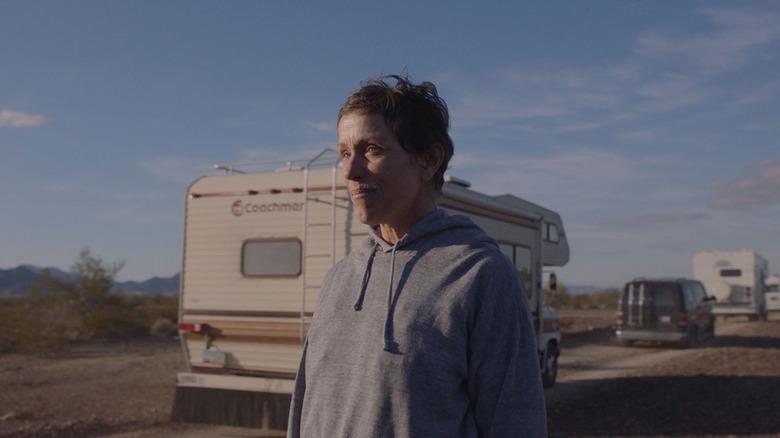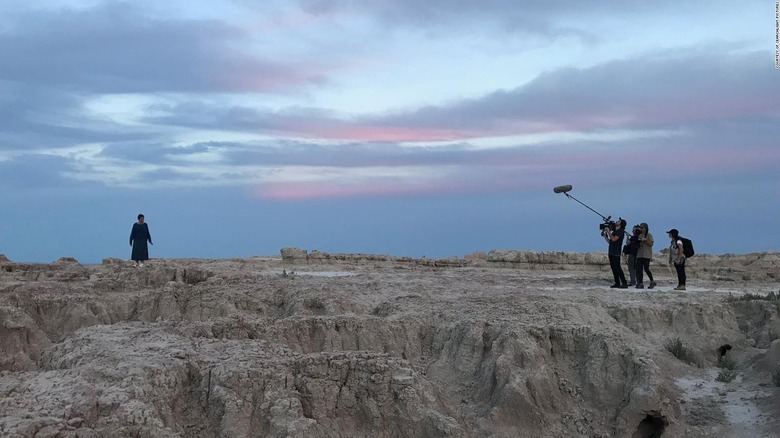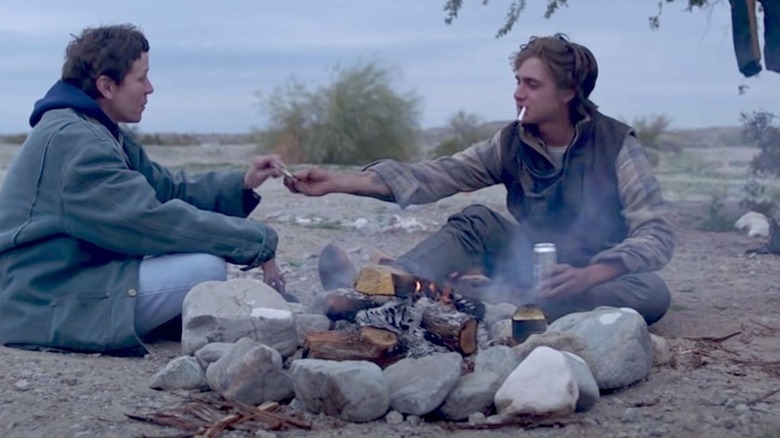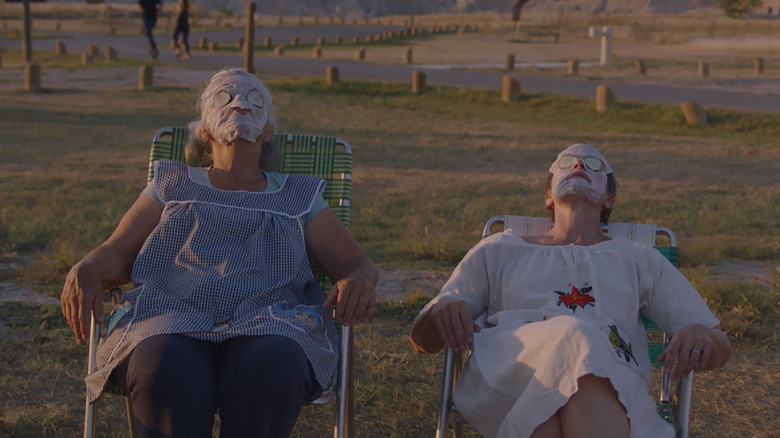The Fascinating True Story Behind Nomadland
Director Chloé Zhao's western/drama "Nomadland" took the 2020 award season by storm. It received four nominations at the 78th Golden Globe Awards, winning Best Motion Picture for Drama and Best Director. Zhao made history by becoming the second woman and the first East Asian woman to win Best Director. In a year filled with all types of uncertainty, loss, and forced innovation, her film felt like an apt portrait of the times.
"Nomadland" follows the impeccable Frances McDormand as Fern, an older woman who takes a solo journey across the United States working odd jobs while simultaneously grieving the death of her husband and their life together. Following the loss of her job at the US Gypsum plant in Nevada, she sells all of her belongings and hits the road in her van. She crosses paths with other friends who either choose or were forced into the nomadic lifestyle, which gives audiences a glimpse into a misunderstood subculture as well as a portrait of how the fallout of a career, loss of a loved one and life's traditional sense of stability can be reimagined. To some, this type of lifestyle may be unrealistic or even seem fabricated, but it isn't. "Nomadland" is partly based on a true story, and the subculture of nomads exists despite what some sheltered eyes may believe.
Based on a Book
Zhao's script and film are loosely based on Jessica Bruder's 2017 nonfiction book "Nomadland: Surviving America in the Twenty-First Century." In a way, the book is an extension of her 2014 cover story for Harper's Magazine titled "The End of Retirement." She conveys the realistic struggle of older Americans who are unable to afford retirement and instead work temporary jobs. Bruder later developed her reporting into her 2017 book.
Bruder chronicles an older generation that has turned to a nomadic lifestyle following the Great Recession of 2008. Migrant workers who self identify as "workampers" have hit the road with vans and RVs taking up odd jobs and stopping at communal campgrounds along the way. While researching her book, Bruder spent months living in a secondhand van which she named "Halen." As she traveled and worked alongside this community, she stated in a Time article that "some walk 15 miles on concrete floors, stooping, squatting, reaching and climbing stairs as they scan, sort and box merchandise." Both Bruder and Zhao capture the emotional highs and lows while living on the road, especially in one's old age. There's a simplicity about their lifestyle that allows them to find the beauty in human connection and experience rather than material items.
The Nomadic Culture
Several characters in the movie play themselves and actually met Bruder on the road while she was researching her book. Linda May, Swankie, and Bob Wells all play themselves and share pieces of their real stories on-screen. For example, Linda May was on the road for 10 years prior to filming and told Variety that "I felt more love from Fran and Chloé and the film crew than I felt from my own biological family. I can never really show my gratitude for that." The culture of these particular nomads is very much like a family. They support one another, help each other when they are in need, and always offer to lend a hand. Since so much emphasis is put on communal living at campgrounds, they barter and trade instead of using monetary exchanges for goods. And when someone leaves whether that be temporary or permanently, it's never "goodbye" only "see you down the road."
Wells differentiates the community of modern nomads with those who partake in #vanlife, since the latter is more performative. The nomadic culture of older populations taking to life on the road is not meant for luxury or seeking validation and likes on a social media platform. However, there are the exceptions of younger generations taking to "workamping" as a result of large student loan debt, job loss due to the pandemic, and rising housing costs.
The Impact
In an interview with IndieWire, Zhao stated that she tried to make "Nomadland" apolitical. Instead, she "tried to focus on the human experience and things that I feel go beyond political statements to be more universal — the loss of a loved one, searching for home."
Bruder emphasized that the film's resonance will perpetuate in our current day and age for two primary reasons. For one, there is the aspect of escapism which is heightened through a dreamy cinematography that will make viewers long to travel after being at home for nearly a year due to the pandemic. The other is the emotional journey of Fern's character. Her personal and financial struggle can be relatable to many people who experienced loss during the pandemic, or just over time in general.
Bruder stated, "Fern has a certain control in not having control of her life. There is a sort of constrained agency, she's dealing with the limitations around her, but also carving her own path." That kind of freedom can be easy to crave these days and when items you own end up owning you, sometimes it's best to downsize and start fresh. "Nomadland" is a beautiful reminder that it's never too late for a fresh start and while leaving for the open road can be a result of open wounds, maybe that's just what you need to heal.



